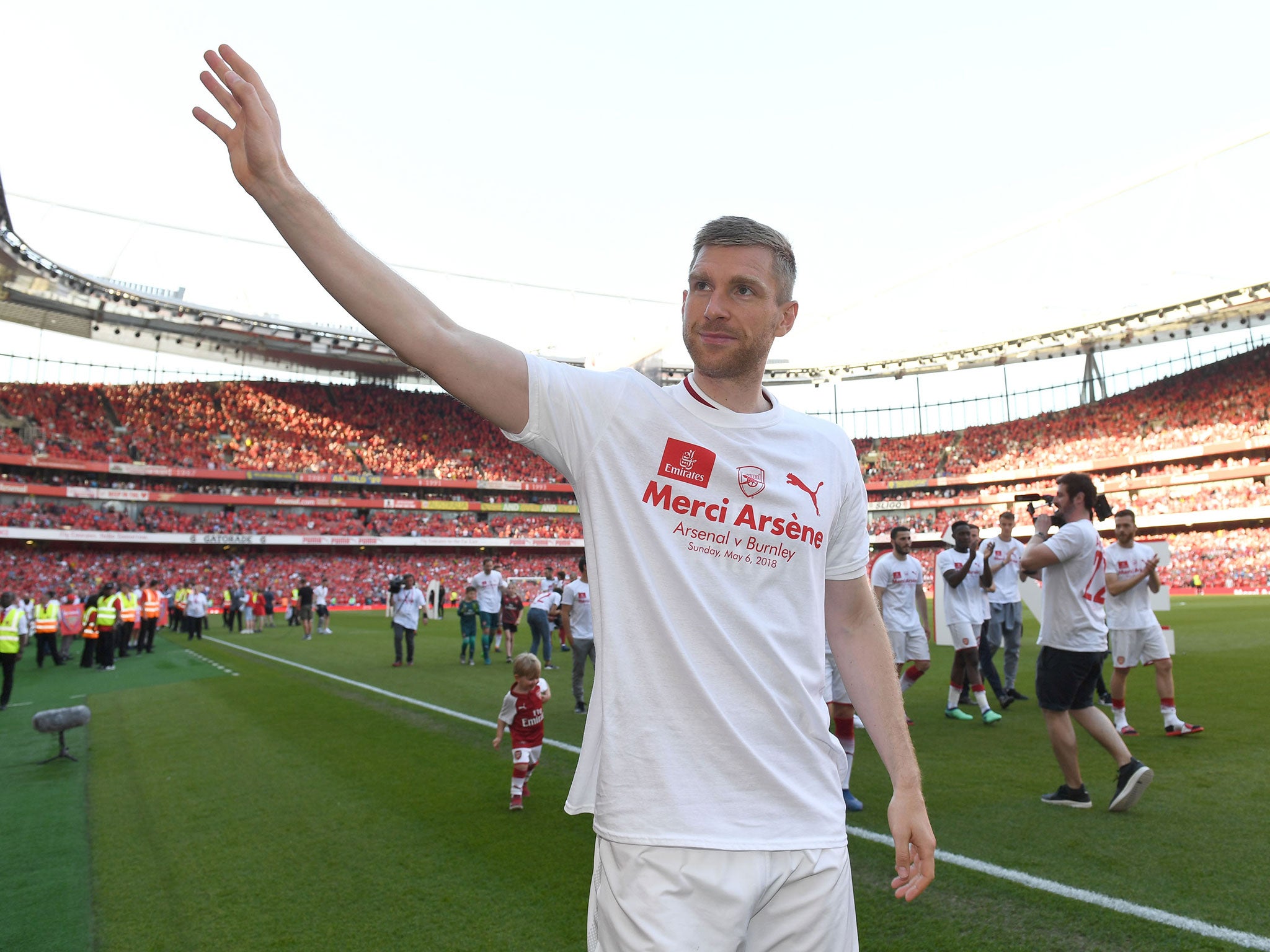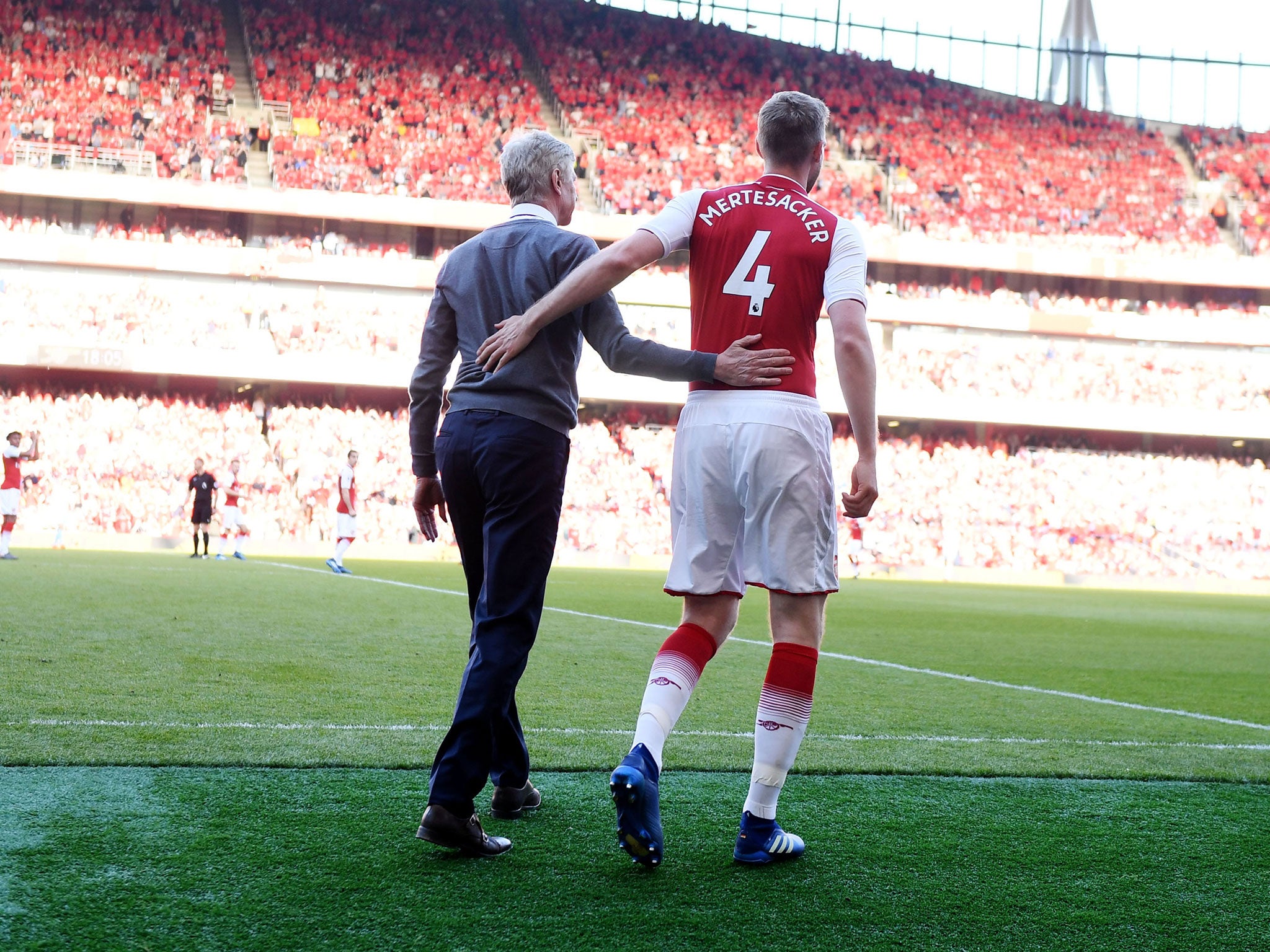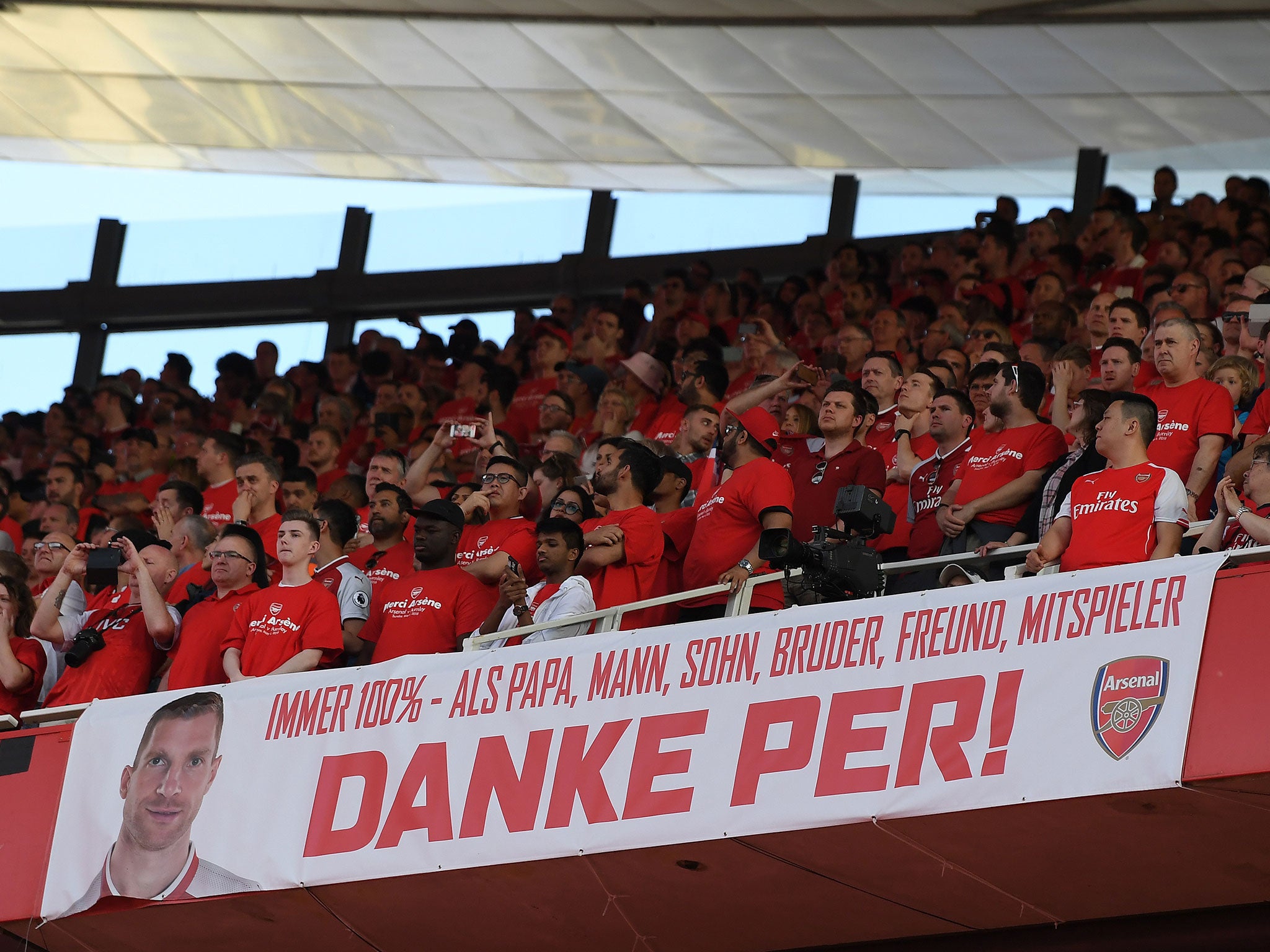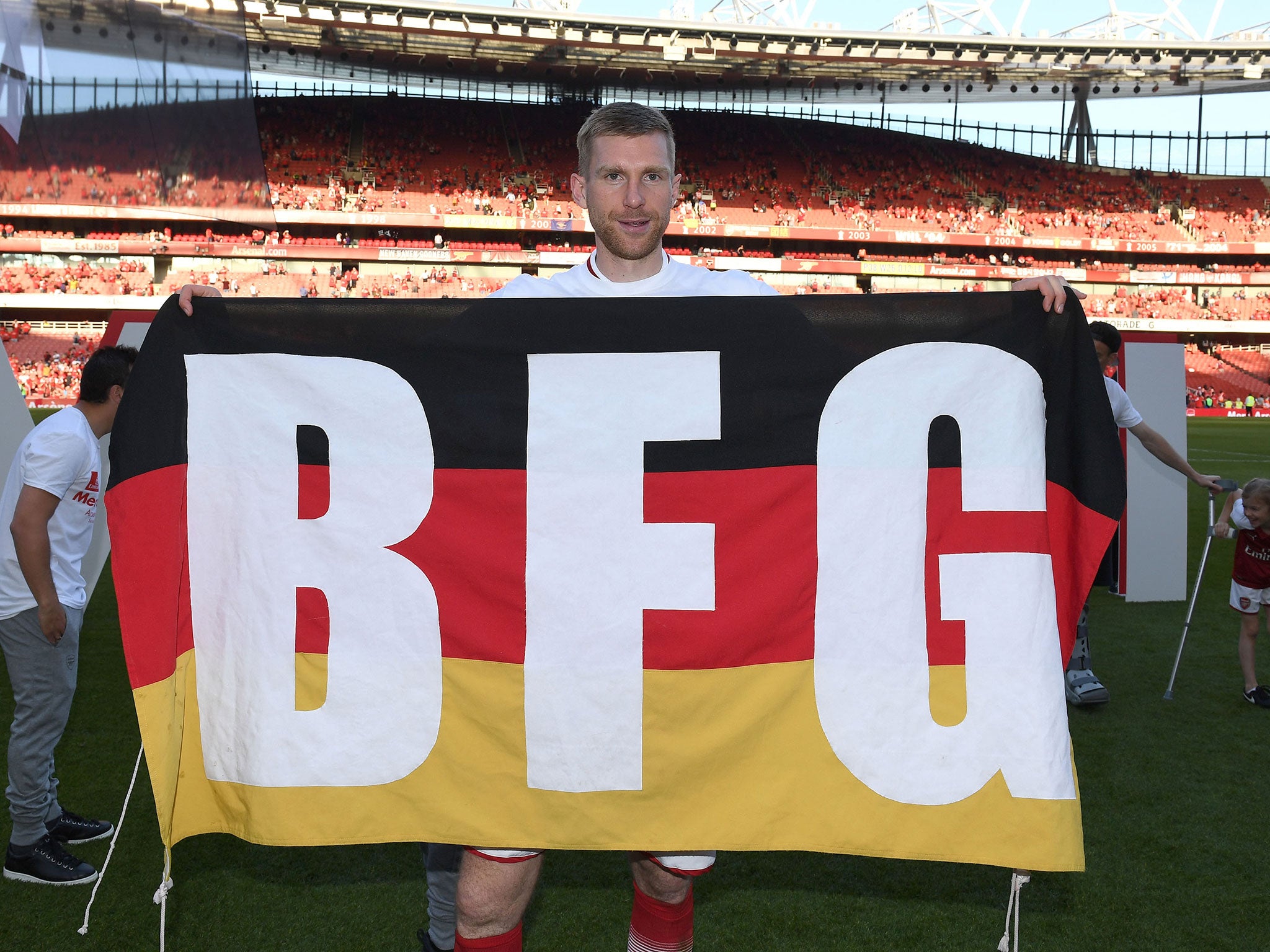Auf wiedersehen Per Mertesacker, a footballing giant even bigger off the field than he was on it
The Arsene Wenger era at Arsenal may be over but with Mertesacker set to stay on behind the scenes some of his values and spirit may yet endure

The morning after Germany’s devastating defeat to Italy in the 2006 World Cup semi-final, as a traumatised host nation picked over the fragments of its shattered dreams, a strange and unfamiliar sensation came over Per Mertesacker, the team’s young centre-half. “I was relieved,” he remembered later. “All I thought was: it’s over, it’s over. It’s finally over.”
Those words came to mind again on Sunday afternoon, as Mertesacker took his final curtain call as a professional footballer. And perhaps the best way of characterising his relationship with the game is that from an early age, it has been the most exquisite form of agony. As he took his final strides in an Arsenal jersey to warm applause, there was sadness and there was appreciation. But there were precious few regrets. Finally, he was free.
He may be only 33, but doctors tell him his right knee is in bits. The cartilage may never recover from the punishment it has taken over two decades. His immense height, such an asset to his defensive game, has ultimately proved his undoing. It has long been thus, ever since he was forced to take an entire year out of the game at the age of 15 because of the unique stresses his growth spurt was placing on his body.
Then there’s the nausea. On the morning of a game, Mertesacker recently confessed his stomach will start churning and not stop until the whistle blows. Food refuses to stay down. Some days he will empty his bowels half a dozen times before kick-off. After an evening game, he will often struggle to sleep until 5am. For Mertesacker, professional football has been a treadmill of sickness and anxiety, sleepless nights and aching limbs.
So why did he put himself through it all? For one reason alone: the unmatchable drug of winning, the greatest legal high known to man. A player whose own father, a bank manager and amateur football coach, once told him would never make it as a professional ended up lifting the FA Cup at Wembley, the World Cup in Brazil and winning more than 100 international caps. Not bad for a defender whose unseemly gait and lumbering pace often evokes Tommy Docherty’s much-quoted assessment of Alf Ramsey, that he had seen milk turn faster.
He did it the simple way, but never the easiest. “Win your headers, win your duels, play the simple pass,” he said in a video message to his younger self for the Arsenal website. Above all, play for the team. Mertesacker may not have been the world’s greatest centre-half, but no dressing room was weaker for his presence. During the last World Cup, his national team-mates pinpointed an angry television interview after a scrappy 2-1 win over Algeria - an outburst Mertesacker admitted was partly calculated - as the moment when they felt strong and united enough to triumph.
According to Rafa Honigstein’s book Das Reboot, when the interview was replayed in cinemas as part of the Germany’s World Cup film, it was greeted with wild applause. Yet the very next game, Mertesacker was demoted to the bench as Joachim Low sought greater mobility at the back. In the brutal lunchtime heat of Rio de Janeiro, Mertesacker appointed himself water-distributor, throwing bottles to his team-mates from the sidelines.

Yet Mertesacker was never under any illusions that being good at football made you a better person. And so perhaps the most impressive thing about him was the parallel life he built for himself, one in which he was determined to be worldly, compassionate and generous. “How you perform on a football pitch,” he said, “doesn’t tell anyone anything about what you are like as a human being.”
And so while he was trying to find his peak as an athlete, Mertesacker was also trying to become a model citizen. Perhaps he always had it in him, from the moment he refused national service on the basis of his pacifism (as well as his height, which he argued made him too big to fit in a tank or a submarine). Instead, he spent 18 months working in a mental hospital with the severely disabled, an experience that never truly left him. Only a couple of months ago, when a group of Arsenal fans with Downs Syndrome were invited to the Emirates for the Watford game, it was Mertesacker who gave up his time to receive them, sign autographs and pose for photographs.

He took great interest in the refugee crisis, coaching them on behalf of the club’s foundation and donating a day’s wages to charity. And when one evening his neighbours in Hampstead invited him to a Shabbat dinner - he resolved to build ties with the local Jewish community, appearing at a fundraising event at St John’s Wood synagogue where he held court on everything from the legacy of the Holocaust to Arsene Wenger’s zonal marking at corners.
Mertesacker may have been born the son of a Hannover bank manager, but these days north London also has him in its grip. An Arsenal fan from the moment he first visited the country to visit his aunt at the age of nine and took possession of his first JVC shirt, he can often be seen in the cafes and restaurants of Hampstead, patiently posing for selfies and chatting away in his Cockney-inflected German accent.

And once he returns from his holidays, he’ll join the Arsenal academy, a mentor at a club that has always had a tradition of handing down knowledge. Ashley Cole learned his trade at the hands of Tony Adams. Thierry Henry developed his skills under the tutelage of Dennis Bergkamp. And indeed, perhaps the beginning of Arsenal’s decline under Wenger around a decade ago was the point at which that process began to grind to a halt, before grizzled pros like Mertesacker arrived, when a bunch of talented youngsters flattered and floundered in the absence of an emotional rudder.
There was a time when Wenger’s Arsenal was almost criminally derelict when it came to retaining its sharpest footballing brains. Patrick Vieira, Henry and Mikel Arteta were all allowed to slip through the net. Bergkamp would have got on the first plane to London if he had been asked to help out. Mertesacker’s new role demonstrates, perhaps, a determination to learn from past mistakes; a conviction that although the Wenger era may be over, some of his values and spirit may yet endure.
Join our commenting forum
Join thought-provoking conversations, follow other Independent readers and see their replies
Comments
Bookmark popover
Removed from bookmarks